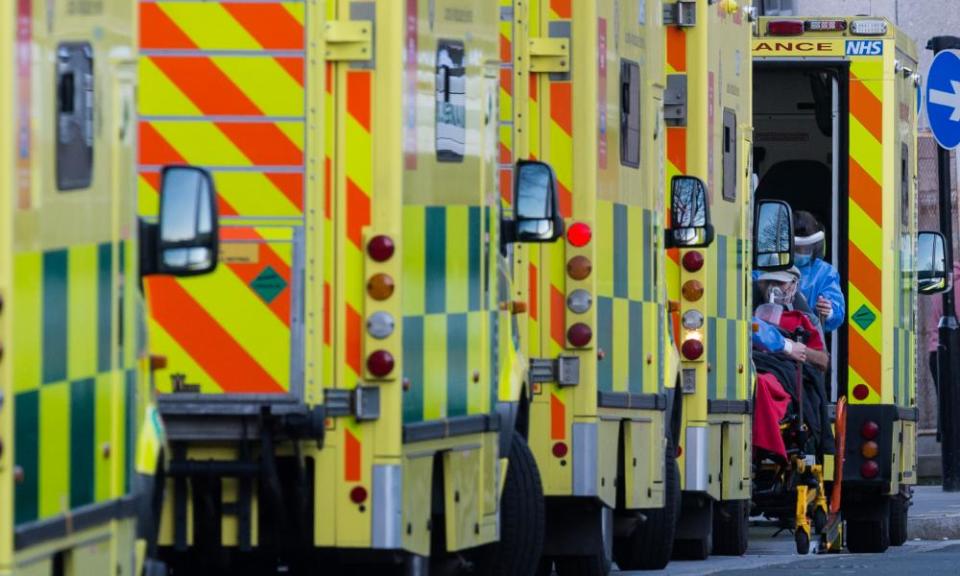The Guardian view on the government’s Covid response: fix the failures

Can the government learn from its mistakes? Though the evidence is hardly encouraging, it must. More than 38,000 Covid patients are in hospital in the UK, and another is admitted every 30 seconds. More than a thousand people are dying each day – each one a painful absence in countless more lives.
The Office for National Statistics says that in the week to last Saturday the percentage of people testing positive for Covid decreased slightly in England and levelled off in Wales and Scotland, though it rose in Northern Ireland. But as Prof Chris Whitty warned, levels remain very high, very precarious and are not declining in all places and age groups. One major survey has suggested that new infections are now stable or possibly even rising slightly.
Worryingly, it appears that the new UK variant is not only more transmissible, but may also be more deadly, and some fear that the South African and Brazilian variants may be less susceptible to the current vaccines. The more that is learned about them, the clearer become the dangers of assuming there is a “safe” level of coronavirus within the community: when it is being transmitted more, it is more likely to alter. The pace of vaccination is cheering and must be maintained – but it will not be enough to get us out of this crisis.
The government cannot undo many of its most terrible mistakes; the public has already paid for the late lockdowns and the Christmas relaxation. But it need not repeat its errors, and can fix others. Its reluctance to tighten rules quickly enough, and rash insistence on relaxing them too fast, must end.
The prime minister was uncharacteristically sombre on Friday, saying that there could be “another big rebound” if restrictions are released too early. Prof David Spiegelhalter of Sage has predicted “the mother of all battles” next month if deaths and infections drop considerably while hospitals and their intensive care units remain under heavy pressure: “Loosening it up will inevitably lead to an increase in cases, a resurgence of the pandemic among younger groups and … that does seep through into hospitalisations,” he warned.
Another key failure has been the government’s counterproductive reliance on punitive messaging – such as the announcement of £800 fines for those attending large parties. Despite some appalling breaches of the rules, most people are complying, and have often been more careful than instructed.
It is not only that this attempt to shift the blame is insulting. It is that it allows the government to avoid tackling the real problem: the rules themselves, which mean too many people are going to non-essential work; and the failure to help people to abide by them – by communicating them and the reasons for them clearly; and by offering adequate support. People will continue to take their chances when they do not fully understand the risks, when they cannot afford to do otherwise, or when their bosses force them.
Ministers have finally recognised that wanting to avoid self-isolation is the single biggest reported barrier to requesting a test. The government’s polling suggests that only 17% of people with symptoms are coming forward. The proposal for a £500 payment to all who test positive is a welcome sign that the penny has dropped – though overhauling one of the meanest statutory sick pay schemes of any developed nation, and catching the low-earning self-employed via a sizable payment through universal credit, would be smarter and more affordable. The government should also trial other forms of support for self-isolation, including the provision of accommodation, to cut household transmission.
Other workers report being ordered back into the workplace unnecessarily, including into unsafe conditions. Decades of underregulation and underfunding of agencies have left them with little protection; the Health and Safety Executive is simply not equipped to tackle this problem. Councils should be supported to inspect and take action. The mooted introduction of quarantine hotels for international arrivals, instead of relying on self-policed isolation, is a long overdue measure.
Ministers have had months to think about many of these options. It is enraging that even now they struggle to engage with them. But they can still fix their failures – and they must.

 Yahoo Movies
Yahoo Movies 